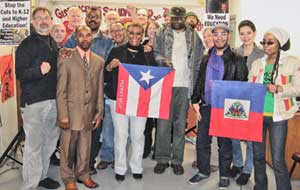Meeting builds support for UPR student struggle
By
Steve Gillis
Boston
Published Mar 19, 2011 11:05 AM
|
Boston meeting, March 5.
WW photo
|
Students and teachers fighting Boston public school closures and privatization,
union leaders combating government and corporate attacks on collective
bargaining and cuts to health care and pensions, women’s groups battling
the defunding of health clinics and social services, anti-war activists, and
leaders of the Puerto Rican and Haitian national liberation movements gathered
March 5 at Boston’s Action Center to kick off a week of activities in New
England planned to bolster solidarity with the courageous students’
strike at the University of Puerto Rico.
The meeting was part of an international campaign called by The Puerto Rican
Diaspora Solidarity Coordinating Committee — and co-sponsored in Boston
by Workers World Party and the Women’s Fightback Network — that
projected a World Day of Solidarity with the University of Puerto Rico in
Amsterdam, Barcelona, Madrid, Manchester, New York, Chicago, Hartford,
Philadelphia and Boston centered around March 11.
Alberto Barreto Cardona, Ph.D., a longtime Puerto Rican independence activist,
underlined his talk with vivid, front line photos of recent violent police
attacks on students at UPR. “If the Puerto Rican police are not removed
immediately, completely and permanently from all UPR campuses,” he said,
“it will only be a matter of time before another March 11, 1971 —
the bloodiest day in the history of the University of Puerto Rico.”
On March 4, 1970, during a student demonstration, police bullets executed
student Antonia Martínez Lagares. The response was years of struggle by
students, the UPR community and a broad section of Puerto Rican society to ban
the police and ROTC from campus. This campaign succeeded following the bloody
police assault on students the next year, mentioned above, during which a
student and two police officers, including the chief of the notorious Tactical
Operations Unit, were killed, the ROTC building was burned, and the colonial
government was forced to totally withdraw its forces.
Forty years later, Barreto, who had spent the previous month supporting student
civil disobedience actions at the UPR’s main campus in Río Piedras,
reported on the current struggle. Puerto Rico’s Tea Party-backed governor
has ordered police to once again occupy the public campuses to try to break the
resolve and solidarity of the students. The governor’s unilateral
imposition of new unaffordable fees is forcing 10,000 students out.
Barreto put the struggle in the context of the worldwide neoliberal and
capitalist attacks aimed at privatizing public institutions, laying off workers
and lowering wages, and taking away social benefits won through struggle
decades ago, from Wisconsin to Greece. In the past year, Puerto Rico’s
U.S-sponsored colonial government has laid off more than 26,000 public workers.
U.S.-owned corporations there laid off thousands more.
Responding to the demands of U.S. banks, Puerto Rico’s government has
moved quickly to sell off public institutions to private capitalists —
from health care to utilities to land — and many see the governor’s
violent attacks on the UPR students as his opening round to privatize the
university.
Barreto lauded the discipline, democratic organization and courage of the UPR
students, and in particular the leadership of women students. The women have
taken the majority of arrests, and they have faced brutal and sexual violence
from the police, as many of his photos showed in graphic detail. Despite mass
arrests, injuries from police rubber bullets and tear gas, and pressure-point,
torture tactics applied by police to the peaceful protesters, the
students’ resolve stays strong.
The students at UPR, Barreto concluded, are like the “fists in action in
Egypt, in Wisconsin, in Ohio,” which unequivocally disprove the
“post-colonial” worldview of bourgeois academics and political
misleaders, and prove that the violence of capitalism can be overcome and
finally defeated.
Ricardo Ramos, a recent graduate of the UPR now studying in Boston, told of his
participation last year in the first phase of the student strike, when students
organized new representative bodies, built unity with professors and other
university workers, developed their own media, such as Radio Huelga, and
occupied and struck the 11 campuses of the UPR. They won a historic agreement
from the administration that rescinded the new fees and provided amnesty for
student leaders, among other gains. Now the government and new administration
have torn up the agreement with brutal police force.
Robert Lamothe, a Boston public school teacher and producer of the new
documentary, “Teach” (www.filmourwayfilms.com), inspired the Boston
meeting with an eyewitness video report from the frontlines in Madison, Wis.
Articles copyright 1995-2012 Workers World.
Verbatim copying and distribution of this entire article is permitted in any medium without royalty provided this notice is preserved.
Workers World, 55 W. 17 St., NY, NY 10011
Email:
[email protected]
Subscribe
[email protected]
Support independent news
DONATE


